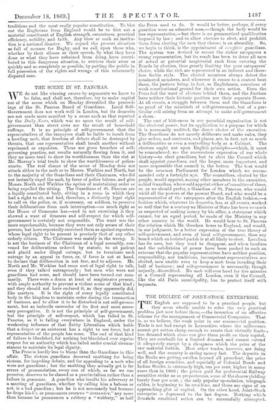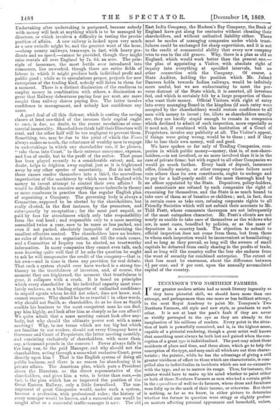THE DECLINE OF JOINT-STOCK ENTERPRISE.
THE English are supposed to be a practical people, but they seem wholly unable to solve the very practical problem just now before them,—the invention of an effective scheme for the management of Commercial Companies. That is, as we believe, the weak point in our commercial position. Trade is not bad except in Lancashire, where the millowners cannot get cotton cheap enough to create that virtually limit--. less demand which alone can give them profit on their capital.. They are overbuilt for a limited demand, and cannot extend it adequately except by a cheapness which the price of the raw material forbids. Most other trades, however, are doing well, and the country is saving money fast. The deposits in the Banks are getting swollen beyond all precedent, the price of all foreign securities, and especially of Colonial Bonds and Indian Stocks, is extremely high, ten per cent. higher in many cases than in 1866 ; the prices paid for preferential Railway securities strike us as preposterous, some of the shares yielding barely four per cent. ; the only popular speculation, telegraph cables, is beginning to be overdone, and there are signs of an approaching glut of capital. On the other hand, Joint-Stock enterprise is depressed to the last degree. Nothing which demands combined action can be successfully attempted. Undertaking after undertaking is postponed, because nobody with money will look at anything which is to be managed by directors, or which involves a difficulty in testing the precise position of affairs. A new railway is looked upon very much as a new swindle might be, and the greatest want of the hour, —cheap county railways, tramways, in fact, with heavy gra- dients and no speed,—cannot be provided, though they might raise rentals all over England by 7s. 6d. an acre. The prin- ciple of insurance, the most fertile ever introduced into commerce, lies unworked, though there are entire fields of labour in which it might produce both individual profit and public good ; while as to speculations proper, projects for new enterprises of the trading kind, nobody will listen to them for a moment. There is a distinct diminution of the readiness to employ money in combination with others, a diminution so great that Railway debentures paying four per cent. are more sought than railway shares paying five. The latter involve confidence in management, and nobody has confidence any more.
A good deal of all this distrust, which is costing the saving classes at least one-third of the incomes their capital ought to earn, is due, no doubt, to the recent revelations of com- mercial immorality. Shareholders think half theirDirectors will steal, and the other half will be too negligent to prevent them. Something, too, may be due to the point of which the Times always makes so much, the reluctance of wealthy men to engage in undertakings in which any shareholder can, if he pleases, take them into Court," to their extreme annoyance, expense, and loss of credit, but to the profit of the suitor. That game has been played recently to a considerable extent, and, no doubt, helps to frighten away capital, just as it is frightened away by any other species of uncertainty. But do not both these causes resolve themselves into a third, the marvellous imperfection of the machinery by which men in England with money to invest attempt to control their own affairs ? It would be difficult to conceive anything more imbecile in theory or more cumbrous in practice than the regular English plan of organizing a Company. The governing body is always a Committee, supposed to be elected by the shareholders, but really elected, in the first instance, by the promoters, and subsequently by co-optation ; for the most part unpaid, or paid by fees for attendances which only take responsibility from the real head ; and responsible only to a mass meeting assembled twice a year, sure to be more or less packed, and even if not packed, absolutely incapable of exercising the smallest effective control. The shareholders have no leaders, no rules of debate, no organization, and till the crash comes, and a Committee of Inquiry can be elected, no trustworthy information. In many companies they cannot even talk, each man knowing quite well that if he asks the question he ought to ask he will compromise the credit of the company—that is, his own—and in none is there any provision for real debate. That such a system should ever have worked is a strong tes- timony to the trustfulness of investors, and, of course, the moment they are frightened, the moment that trustfulness is gone, it collapses with a crash. It is based on principles which every shareholder in his individual capacity most reso- lutely eschews, on a binding etiquette of unlimited confidence in unpaid agents whom he did not select, does not know, and, cannot remove. Why should he be so trustful ? in other words, why should not Smith, as shareholder, do as he does as Smith -confide his business to the most competent man he can find, pay him highly, and look after him as sharply as he can afford? We quite admit that a mass meeting cannot look after any- body, but why should the ultimate power rest with a mass meeting? Why, to use terms which are too big but which are familiar to our readers, should not every Company have a Governor and Court of Proprietors, the latter meeting monthly, .and consisting exclusively of shareholders, with more than, say, a thousand pounds in the concern ? Power always falls in the long run, to the paid Manager, and why should not the shareholders, acting through a somewhat exclusive Court, press directly upon him ? That is the English system of doing all public business, and there is no reason for abandoning it in private affairs. The American plan, which puts a President above the Directors, as the direct representative of the shareholders, and gives him a veto, is better than ours,—in fact, is the plan which has so improved the position of the Great Eastern Railway, only a little formalized. The ma- nagement of great Companies would, under such a system, become a profession, with professional rules ; the history of every manager would be known, and a successful one would be sought after as a successful traffic-manager is now. The old j
East India Company, the Hudson's Bay Company, the Bank of England have got along for centuries without cheating their shareholders, and without unlimited liability either. There must be modes of managing companies under which trust- fulness could be exchanged for sharp supervision, and it is not to the credit of commercial ability that every new company tries to run in the old groove. Why, there is a plan as old as England, which would work better than the present one,— the plan of appointing a Visitor, with absolute right of inquiry into everything at specified intervals, but no other connection with the Company. Of course, a State Auditor, holding the position which Mr. Juland Danvers holds towards Indian railways, would be infinitely more useful, but we are endeavouring to meet the per- verse distrust of the State which, it is asserted, all investors feel, and which is certainly felt by a large proportion of those who want their money. Official Visitors, with right of entry into every managing Board in the kingdom (if such entry were accepted by the shareholders) would restore confidence to all men with money to invest ; for, idiots as shareholders usually are, they are hardly stupid enough to remain in companies which declined to admit of such inspection, more especially as it need not, if combined with the institution of a Court of Proprietors, involve any publicity at all. The Visitor's appeal, if things were going wrong, would be to them ; and if they like to lose their own money, well and good.
We have spoken so far only of Trading Companies, com- panies in which public money—money, that is, of non-share- holders,—is not involved, or no more involved than it is in the case of private firms; but with regard to all other Companies we would go much farther. Every bank of deposit, insurance office, friendly society, or other company whose failure must ruin others than its own constituents, ought to undergo and to pay for a half-yearly audit of the most thorough kind by an officer appointed by the State. Depositors, policy-holders, and annuitants are refused by such companies the right of examining for themselves, and the State is as much bound to take care of them as of lunatics or children ; and, in fact, does in certain cases so take care, refusing corporate rights to all Friendly Societies which will not submit their accounts to Mr. Tidd Pratt, whose comments thereupon are not infrequently of the most outspoken character. Mr. Pratt's clients are not nearly so unable to take care of themselves as the widows who are, in most cases, benefited by policies, or as the mass of depositors in a country bank. The objection to submit to official inspection does not come from them, but from those to whom such inspection would be inconvenient or humiliating; and so long as they prevail, so long will the owners of small capitals be debarred from easily sharing in the profits of trade, and so long will the country suffer the loss she endures from the want of security for combined enterprise. The extent of that loss must be enormous, about the difference between 4i per cent. and 8 per cent. upon the annually accumulated capital of the country.







































 Previous page
Previous page